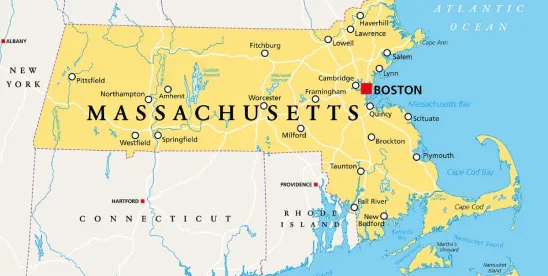In the ever-evolving landscape of employment law, a recent Massachusetts Supreme Judicial Court (SJC) opinion, Patel v. 7-Eleven, Inc., has shed light on a critical question: When is a franchisee considered an employee of the franchisor? This question was at the heart of a case involving five franchisees and the well-known franchisor, 7-Eleven, Inc.
Quick Hits
- In answering a question certified from the U.S. Court of Appeals for the First Circuit, the Massachusetts Supreme Judicial Court held that under Massachusetts law, certain business-to-business relationships in which franchisees have chosen to operate their independent businesses using a business format franchise, the franchisees are not employees of the franchisor.
- In so holding, the court determined that the plaintiff franchisees at issue were not employees because they did not “perform services” for the franchisor within the meaning of the Commonwealth’s independent contractor statute.
- The court noted that it was “significant” that “the franchisees, rather than opening a retail store under their own name and goodwill, chose to purchase the right to use the [franchisor’s] branded business format franchise and to operate their [businesses] using the goodwill and associated market power of that intellectual property.”
- The court’s answer to the certified question will influence the interpretation of employment law within the context of franchise relationships.
Background
At the heart of the case is the Massachusetts independent contractor statute (Mass. G.L. c.149, § 148B), which establishes a criteria-based “ABC test” to distinguish between employees and independent contractors. This test presumes employment and dictates that an individual is an independent contractor only if the potential employer can establish the following:
- The individual is free from control and direction in connection with the performance of the service.
- The service is performed outside the usual course of the business of the employer.
- The individual is customarily engaged in an independently established trade, occupation, profession, or business of the same nature as the service performed.
Five franchisees of 7-Eleven initiated a legal challenge, aiming to be recognized as employees—a designation that would entitle them to enhanced benefits and legal protections. The dispute ascended to the U.S. Court of Appeals for the First Circuit, where judges faced the complex task of interpreting the Massachusetts independent contractor statute alongside the Federal Trade Commission’s (FTC) Franchise Rule. The First Circuit initially sought direction from the SJC, inquiring if the “three-prong test for independent contractor status set forth in [the independent contractor statute] applies to the relationship between a franchisor and its franchisee, where the franchisor must also comply with the [Federal Trade Commission (FTC) Franchise Rule.”
In 2022, the SJC affirmed the applicability of the test and stated that “the independent contractor statute requires examination of the facts of each case, which begins with a threshold determination whether the putative employee ‘perform[s] any service’ for the alleged employer.”
Armed with this guidance, the First Circuit pursued clarification from the SJC on whether, in the context of the independent contractor statute, the franchisees’ fulfillment of their contractual obligations under the franchise agreement, coupled with 7-Eleven’s receipt of a share in the gross profits, constituted “perform[ing] any service” for 7-Eleven.
The SJC’s Decision
In its analysis, the SJC reached a pivotal conclusion regarding the classification of 7-Eleven franchisees, determining that “the franchisees, rather than operate their convenience stores under their own name and goodwill, chose to purchase the right to use the 7-Eleven branded business format franchise.” This arrangement, which included “maintain[ing] the integrity” of the 7-Eleven brand, was agreed upon in exchange for a franchise fee and did not render the franchisees as employees of 7-Eleven.
The SJC’s decision rooted its decision in the purpose of the Massachusetts independent contractor statute, which is, according to the court, “‘to protect workers by classifying them as employees, and thereby grant them the benefits and rights of employment, where the circumstances indicate that they are, in fact, employees.’” However, the court observed that the plaintiffs’ situation, characterized by the typical features of a franchise relationship with 7-Eleven, did not fit the profile of employee status.
In rendering its judgment, the SJC highlighted several critical points:
- Labels are not conclusive: The SJC emphasized that merely labeling a business arrangement as a “franchise” does not shield it from employment law scrutiny, stating, “a franchisor cannot avoid its responsibilities under the wage laws merely by contracting with a franchisee to refer to their relationship as a ‘franchise,’ or to the franchisee as an ‘independent contractor.’”
- Assessment of services rendered: The SJC examined whether the franchisees were performing services for 7-Eleven, concluding that “the franchisees’ compliance with 7-Eleven’s operational standards and payment of a franchise fee did not equate to performing services for 7-Eleven.”
- Consideration of remuneration and revenue: The SJC scrutinized the financial transactions between the franchisees and 7-Eleven and found that the franchisees “do [not] get paid by 7-Eleven for any labor they perform.”
- Recognition of franchise relationships: The SJC acknowledged the inherent independence of franchise operations, stating that franchisees “operate independent stores not for 7-Eleven but rather for themselves.”
By answering “no” to the certified question, the SJC has set a significant precedent that could influence the interpretation of employment law within franchise relationships. This decision underscores the complexity of franchise agreements and highlights the critical need for a clear understanding of the rights and responsibilities that bind franchisors and franchisees. The decision also reinforces the fact that business-to-business relationships in the Commonwealth are not employment relationships.
Key Takeaways
The SJC’s ruling in the Patel case marks a significant moment with far-reaching implications for franchise law. It provides crucial clarification on the status of franchisees in the commonwealth, definitively stating that 7-Eleven’s franchisees are not employees under the Massachusetts independent contractor statute—a crucial distinction that will guide both other franchisees in understanding their rights and franchisors in structuring their business relationships. This decision not only sets a legal precedent that may shape future cases involving franchise relationships in Massachusetts, but it also has the potential to influence courts in other jurisdictions.
Franchisors in the state may find themselves revising franchise agreements to align with the decision’s principles, ensuring the independence of franchisee operations is clearly defined. Furthermore, the ruling highlights the “performing any service” criterion as a critical component of the independent contractor statute. That criterion may also affect the application of similar employment laws in contexts beyond franchising. By reinforcing the franchise model as a structure that supports entrepreneurial independence, the SJC has provided a clearer legal framework for those entering franchise agreements and for those already operating within them. The SJC’s decision is poised to become a foundational element in the ongoing dialogue about worker classification within the franchise industry. It stands as a pivotal reference for future legal discourse.





 />i
/>i

